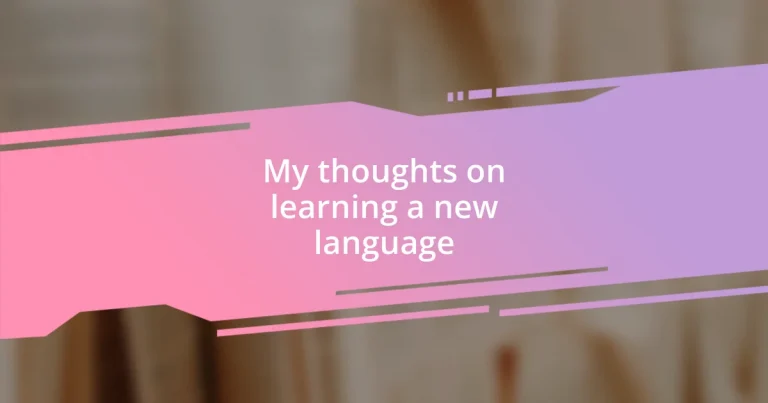Key takeaways:
- Immersion, consistent daily practice, and engaging conversations with fluent speakers are crucial strategies for effective language learning.
- Common challenges include verb conjugation struggles, fear of making mistakes, and difficulties in listening comprehension, which can be overcome with patience and acceptance.
- Setting realistic goals, tracking progress, and celebrating small milestones are essential for maintaining motivation and achieving language proficiency.
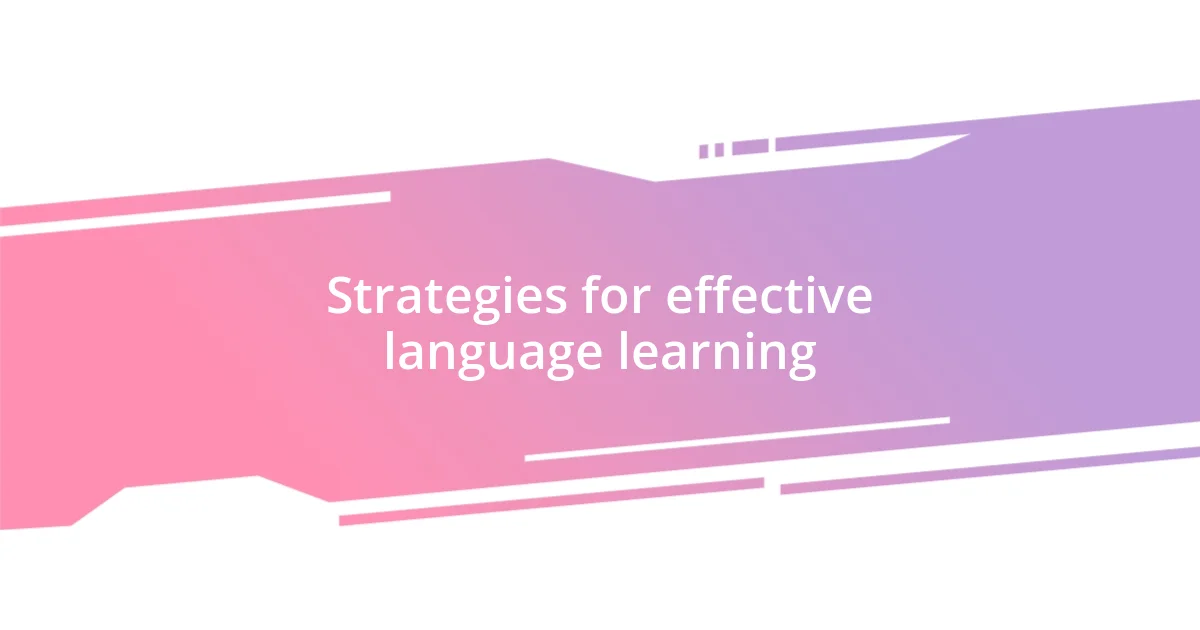
Strategies for effective language learning
One strategy I’ve found incredibly effective in language learning is immersion. When I traveled abroad and was surrounded by native speakers, I was amazed at how quickly I picked up phrases and vocabulary. It made me wonder, have you ever experienced a moment where you had no choice but to rely on the language? That pressure can actually accelerate your learning.
Another approach I suggest is incorporating language into your daily routine. For instance, I started labeling items around my house in the language I was learning. It may sound simple, but every time I reached for a mug or opened the fridge, I was reinforcing my vocabulary. How often do you connect the language to your everyday actions? This kind of association can really help the words stick.
Lastly, I believe in the power of conversation. Engaging in regular dialogues with fluent speakers can boost your confidence and speaking skills tremendously. One time, I joined a language exchange and felt nervous at first, but that experience ultimately transformed my ability to communicate. Have you tried seeking out partners to practice with? It can be daunting, but the rewards are well worth it.
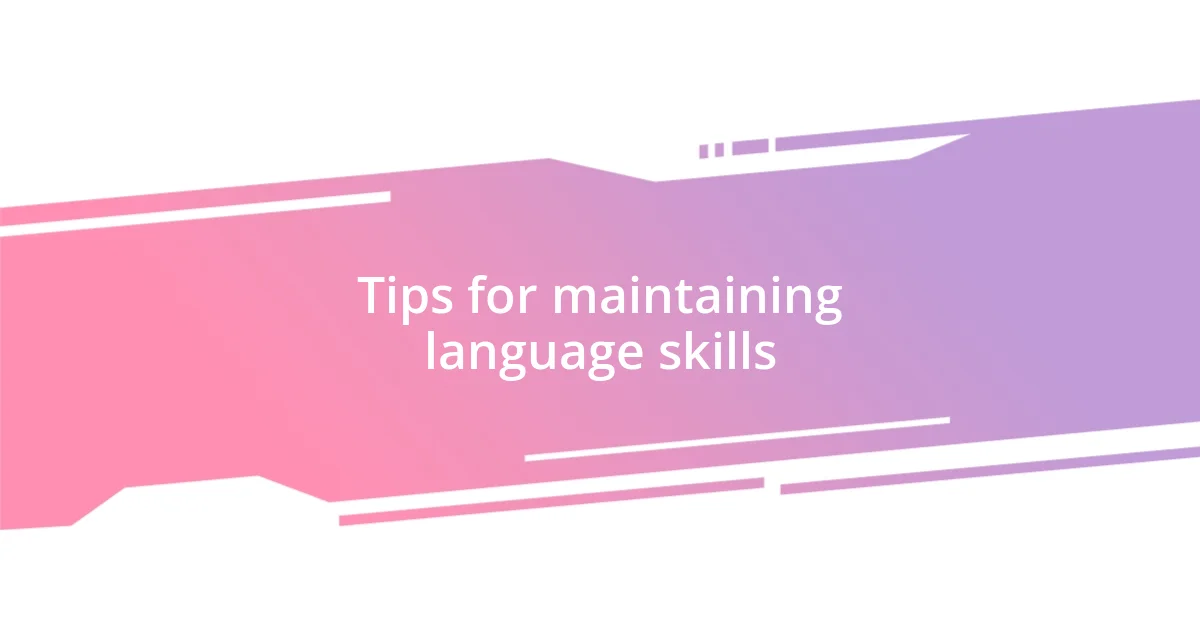
Tips for maintaining language skills
To effectively maintain language skills, I find that consistency truly is key. I try to set aside a little time each day for practice, even if it’s just 10 or 15 minutes. Once, during a particularly busy week, I skipped my daily study, and I could feel my progress slipping. It reminded me how vital it is to integrate the language into my routine. Connecting with what I’m learning helps keep the momentum going.
Here are some practical tips I’ve gathered for maintaining those hard-earned language skills:
- Daily Practice: Even short, regular sessions can be more effective than occasional long ones.
- Use Language Apps: I’m a big fan of language learning apps that let me practice on the go.
- Media Consumption: Watching movies or listening to music in the target language can enhance comprehension and make learning enjoyable.
- Join Online Communities: Finding others who share the same language interest creates motivation and accountability.
- Teach What You Learn: Explaining new vocabulary or grammar rules to someone else reinforces my understanding.
- Set Personal Challenges: I often challenge myself to describe my day in the target language or maintain a journal entry, which keeps my skills fresh and engaging.
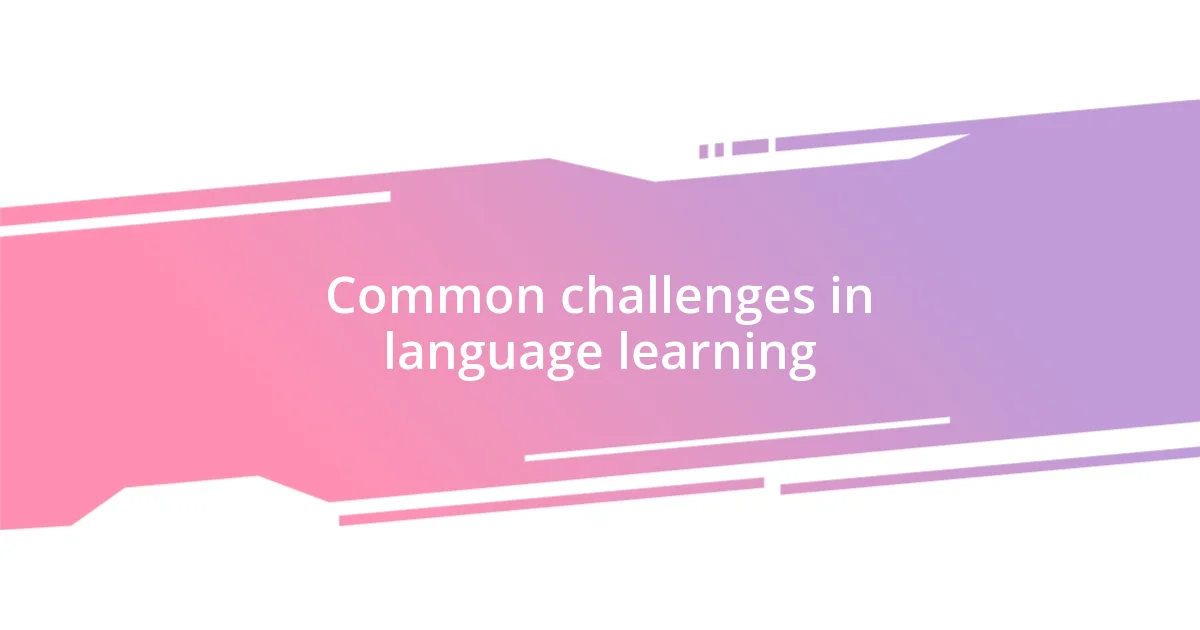
Common challenges in language learning
One of the most common challenges I’ve faced in language learning is the struggle with conjugating verbs. I remember sitting there, staring at a table of irregular verbs, feeling completely overwhelmed. It’s frustrating when you can understand what someone says, but when it’s your turn to speak, the words get tangled. Have you ever felt that pressure in a conversation? It can really throw you off, making you doubt your skills.
Another hurdle many learners encounter is the fear of making mistakes. I can vividly recall a time when I mispronounced a word in front of a native speaker. My cheeks flushed with embarrassment! But here’s what I’ve learned: mistakes are a natural part of learning. Embracing them not only builds resilience but also helps you grow. After all, isn’t that how we all learned as children?
Lastly, listening comprehension can be a real uphill battle. I often found myself nodding along in conversations, though I was lost in translation. One evening, while watching a fast-paced movie in the target language, I realized how challenging it is when the speakers talk quickly and use slang. It made me ponder: how many expressions or phrases went over my head? Gaining fluency in listening requires patience, practice, and a willingness to keep pushing through the confusion.
| Challenge | Description |
|---|---|
| Verb Conjugations | Overwhelming tables of irregular verbs create frustration and confusion. |
| Fear of Mistakes | Feeling embarrassed about mispronunciations can hinder speaking confidence. |
| Listening Comprehension | Fast speech and slang often lead to misunderstandings and confusion. |
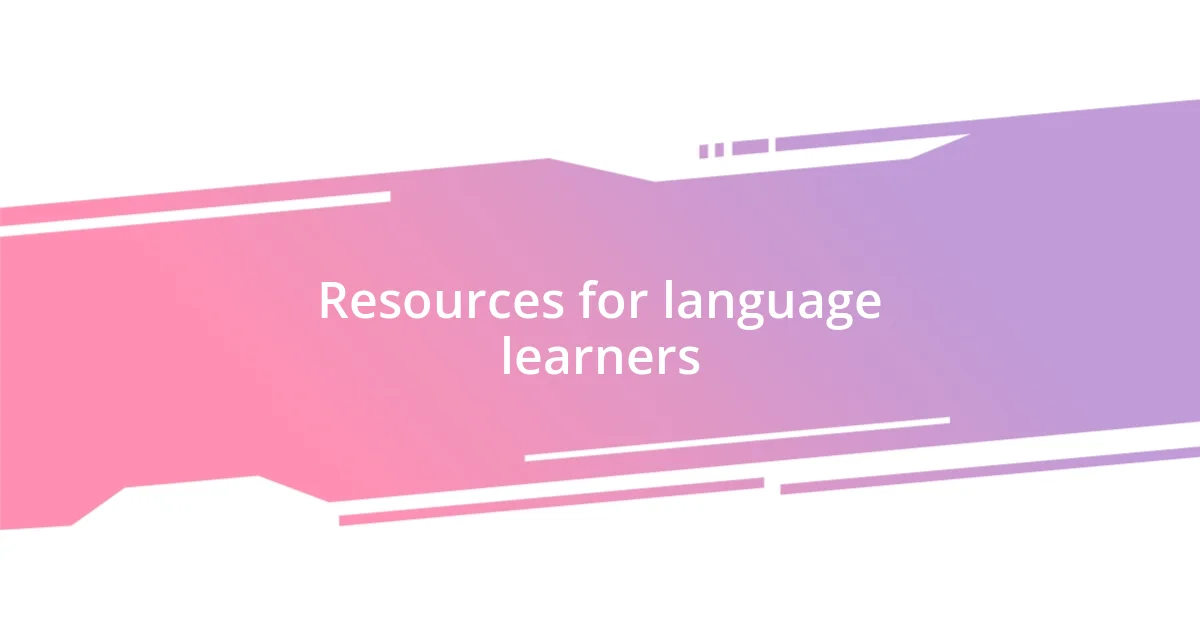
Resources for language learners
When I started learning a new language, I turned to online resources that really enriched my experience. Websites like Duolingo and Babbel offered structured lessons that fit into my busy schedule. Have you ever wondered how flexible tools can enhance your learning? For me, they made it easier to squeeze in a quick session whenever I had a free moment.
Podcasts and YouTube channels also became invaluable. There’s something special about immersing myself in the language while I’m cooking or commuting. One particularly memorable moment was when I was listening to a podcast episode, and suddenly, I understood a joke in the target language! It felt like a lightbulb moment that reinforced my love for learning.
Don’t underestimate the power of language exchange platforms like Tandem or HelloTalk. Connecting with native speakers not only sharpens my speaking skills but also provides cultural insights that textbooks can’t offer. Once, I had an enlightening conversation about traditional dishes from my partner’s home country. It made me realize how much language learning is about building relationships, not just vocabulary. How has your own experience been with language exchanges?
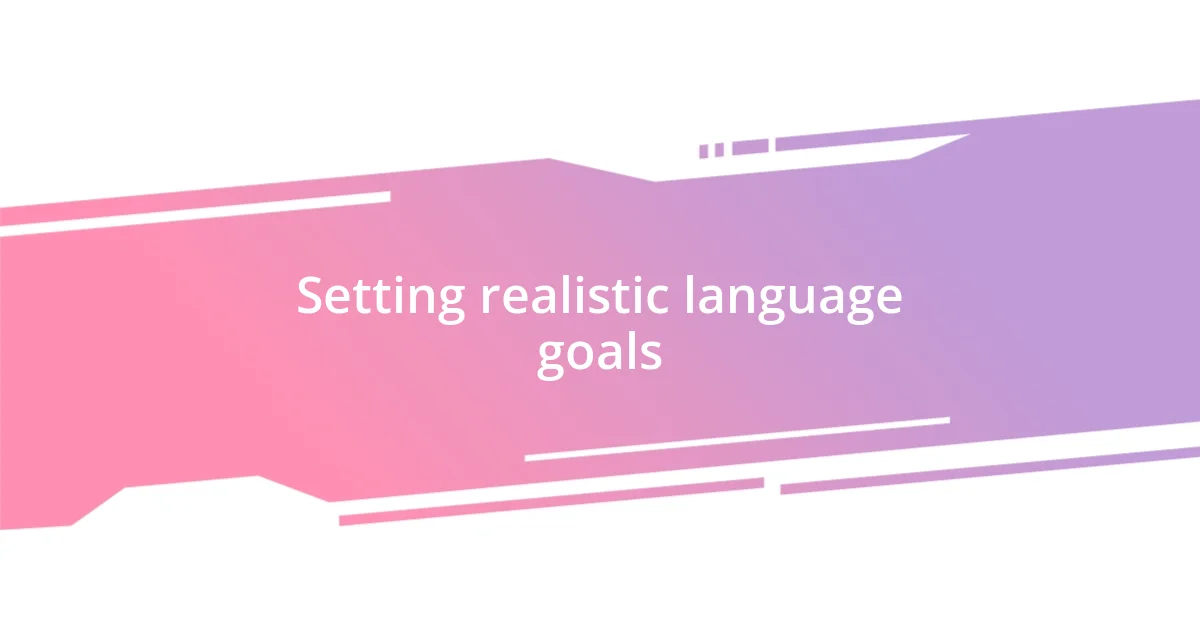
Setting realistic language goals
Setting realistic language goals is essential for success. Early in my learning journey, I aimed to be fluent in just six months, which led to frustration rather than progress. Instead, breaking down my goals into smaller, achievable tasks made all the difference. Have you ever felt overwhelmed by aiming too high? When I shifted my focus to learning ten new words a week, I felt a sense of accomplishment that motivated me to keep going.
Another strategy that worked well for me was setting specific time frames for my goals. I remember deciding to hold a simple conversation after three months of study. It didn’t happen overnight, but when I finally spoke with a friend in my target language, I was thrilled! I realized that celebrating small milestones—like completing a lesson or finishing a book—boosted my confidence and kept my enthusiasm alive.
Lastly, tracking progress can be incredibly rewarding. I started keeping a journal of my achievements, no matter how small. Looking back at those entries, I could see how far I’d come. There’s something deeply satisfying about reflecting on your journey, isn’t there? Each little victory reinforces the idea that language learning is a marathon, not a sprint.
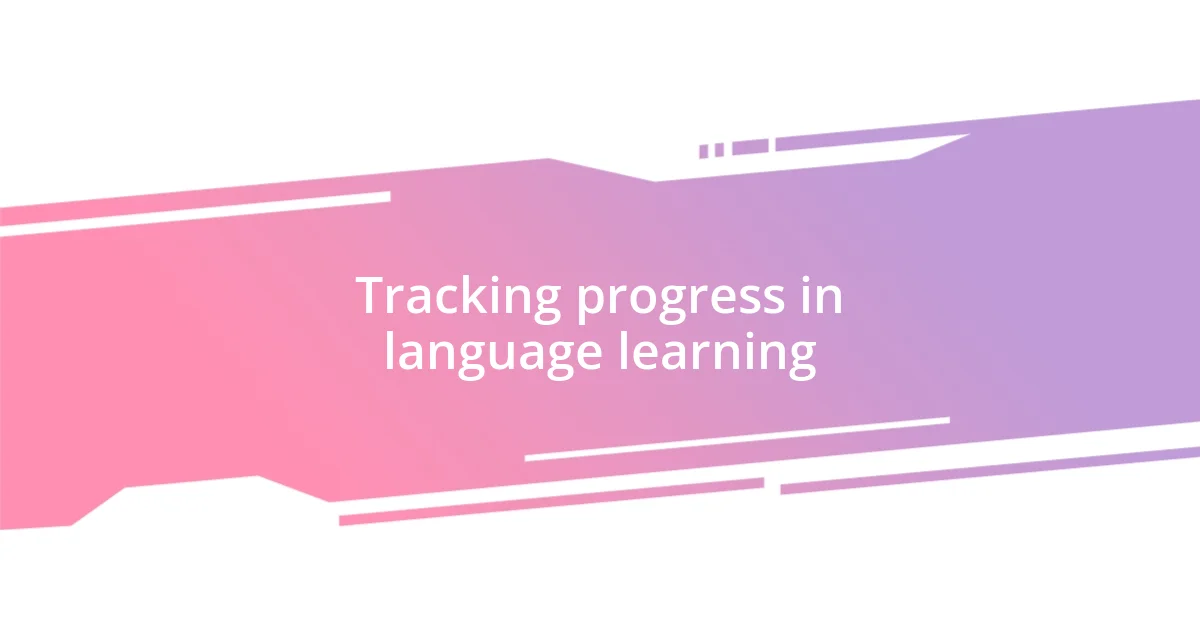
Tracking progress in language learning
Tracking progress in language learning can be an enlightening journey. I found that keeping a weekly log of my study sessions and new vocabulary really transformed how I saw my growth. At first, I was just jotting down what I learned, but soon I realized it turned into a visual testament to my dedication and progress. Have you ever noticed how motivating it can be to see your improvements laid out in front of you?
In my experience, testing myself regularly helped solidify what I had learned. I started taking short quizzes, and I remember the thrill of improving my scores each time. It was a bit like leveling up in a video game; each little success pushed me further. I’d ask myself, “What can I do today to challenge myself?” and that mindset fueled my progress even more.
I also found it helpful to celebrate milestones in creative ways. Once, after mastering basic conversational skills, I treated myself to a movie night featuring films in my target language. As I watched, I couldn’t help but grin at my understanding of jokes and nuances I’d previously struggled with. Reflecting on these moments not only boosted my confidence but reminded me of why I fell in love with learning languages in the first place. Isn’t it amazing how progress can be measured in both small wins and joyful experiences?












